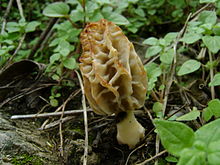| Morchella rufobrunnea | |
|---|---|

| |
| Scientific classification | |
| Domain: | Eukaryota |
| Kingdom: | Fungi |
| Division: | Ascomycota |
| Class: | Pezizomycetes |
| Order: | Pezizales |
| Family: | Morchellaceae |
| Genus: | Morchella |
| Species: | M. rufobrunnea
|
| Binomial name | |
| Morchella rufobrunnea Guzmán & F.Tapia (1998)
| |
| Morchella rufobrunnea | |
|---|---|
| Smooth hymenium | |
| Cap is conical or ovate | |
| Stipe is bare | |
| Spore print is cream to yellow | |
| Ecology is saprotrophic | |
| Edibility is choice | |
Morchella rufobrunnea, commonly known as the blushing morel, is a species of ascomycete fungus in the family Morchellaceae. A choice edible species, the fungus was described as new to science in 1998 by mycologists Gastón Guzmán and Fidel Tapia from collections made in Veracruz, Mexico. Its distribution was later revealed to be far more widespread after several DNA studies suggested that it is also present in the West Coast of the United States, Israel, Australia, Cyprus, Malta and Switzerland.
M. rufobrunnea grows in disturbed soil or in woodchips used in landscaping as a saprotroph. Reports from the Mediterranean under olive trees (Olea europaea), however, suggest the fungus may also be able to form facultative tree associations. Young fruit bodies have conical caps with pale ridges and dark grayish pits; mature specimens are yellowish to ochraceous-buff. The surface of the fruit body often bruises brownish orange to pinkish where it has been touched or injured, a characteristic for which the fungus is named, the New Latin rufobrunnea signifying "rufus brown". Mature fruit bodies can grow to a height of 9.0–15.5 cm (3.5–6.1 in). M. rufobrunnea differs from other Morchella species by its urban or suburban habitat preferences, in the color and form of the fruit body, the lack of a sinus at the attachment of the cap with the stipe, the length of the pits on the surface, and the bruising reaction. A process to cultivate morels now known to be M. rufobrunnea was described and patented in the 1980s.